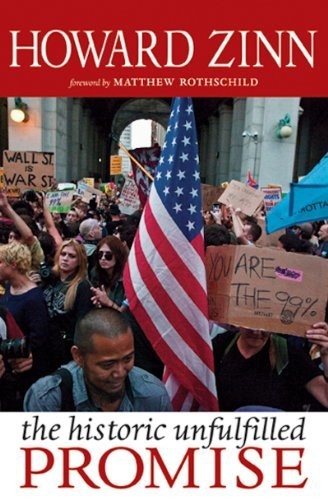
The Historic Unfulfilled Promise
City Lights Open Media
کتاب های مرتبط
- اطلاعات
- نقد و بررسی
- دیدگاه کاربران
نقد و بررسی

Starred review from April 23, 2012
This posthumous collection of Zinn’s passionate, iconoclastic, and wryly humorous articles from the Progressive magazine spans 30 years—from 1980 to 2010—though most are of 21st-century vintage. Zinn argues repeatedly for an alternative to war, totalitarianism, and redistribution of resources and energy away from the military and “toward ideals of egalitarianism, community, and self-determination... which have been the historic, unfulfilled promise of the word democracy.” Zinn (A People’s History of the United States) persists with his optimism and sometimes proves astounding in his almost clairvoyant analysis, as the essays progress from Boston University student and faculty protests against the Vietnam War and the academic “Establishment” through the two Iraq wars, to Obama’s expansion of the war in Afghanistan. In addition, Zinn writes of his own youth and radicalization, and his admiration for artists who “wage the battle of justice in a sphere which is unreachable by the dullness of ordinary political discourse,” including a warm and perceptive memorial to Kurt Vonnegut, with whom he became friends late in life, and with whom he shared a conversion to pacifism after serving in WWII. His call to action will strike a chord with a younger generation of occupiers. Agent: The Ward & Balkin Agency.

June 1, 2012
A collection of essays by American Left icon Zinn (The Bomb, 2010, etc.) originally published in the political journal The Progressive. "What kind of country do we want to live in?" asks the author in these essays dating mostly from the last years of his life, and thus following the historic arc from 9/11 to the wars in Iraq and Afghanistan to the election of Obama. As always, he responds to this question with a radical's zeal, a historian's insights and an activist's optimism. War is on his mind. As the "war on terror" commenced, he railed against what he perceived to be the assault on American liberties this war had allowed. As the invasion of Iraq loomed, he warned against the countless lives that would be lost or ruined. As victory was declared in Iraq, Zinn was there to point out the horror of destroyed innocent lives and the chaos left behind. But the larger issue was war itself: "The abolition of war has become not only desirable but absolutely necessary if the planet is to be saved. It is an idea whose time has come." On the whole, this is not Zinn at his best, as these are, after all, polemical articles meant perhaps more to arouse the converted rather than enlighten the uninitiated. There is also a certain degree of repetition of themes and phrases, as will happen with any collection of articles not originally meant to be read together. Certainly, many readers will not appreciate his message, but the spirit and passion of the messenger, an American original, cannot be denied. A useful introduction to one of America's great scholar-activists.
COPYRIGHT(2012) Kirkus Reviews, ALL RIGHTS RESERVED.

July 1, 2012
Historian and social activist Zinn, who died in 2010, was known for his often controversial views on politics, civil rights, and history. These essays, originally published in the Progressive, were written between 1980 and 2010 and spotlight his plain-speaking writing and keen analytic eye. Readers familiar with Zinn's writings, especially his widely read A People's History of the United States (1980), will note his usual unflinching approach to his subject matter and his apparent lack of regard for potential criticisms of his ideas. Similarly, both Zinn's critics and his fans (there are many of both) will not see any appreciable watering-down of his often contentious views on democracy and war, the two subjects most abundantly represented here. But here there is also an opportunity to see a side of Zinn that was often kept private. His 2007 essay, Remembering Kurt Vonnegut, for example, eulogizes the acclaimed novelist with a rather touching personal statement of Zinn's own affection for him. A sharp and insightful collection from one of the country's most visible historians and critics.(Reprinted with permission of Booklist, copyright 2012, American Library Association.)

























دیدگاه کاربران